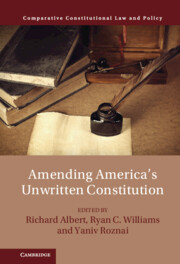Refine search
Actions for selected content:
2 results
6 - State Constitutions and the Interaction between Formal Amendment and Unwritten Commitments
-
-
- Book:
- Amending America's Unwritten Constitution
- Published online:
- 13 October 2022
- Print publication:
- 20 October 2022, pp 121-146
-
- Chapter
- Export citation

Amending America's Unwritten Constitution
-
- Published online:
- 13 October 2022
- Print publication:
- 20 October 2022
